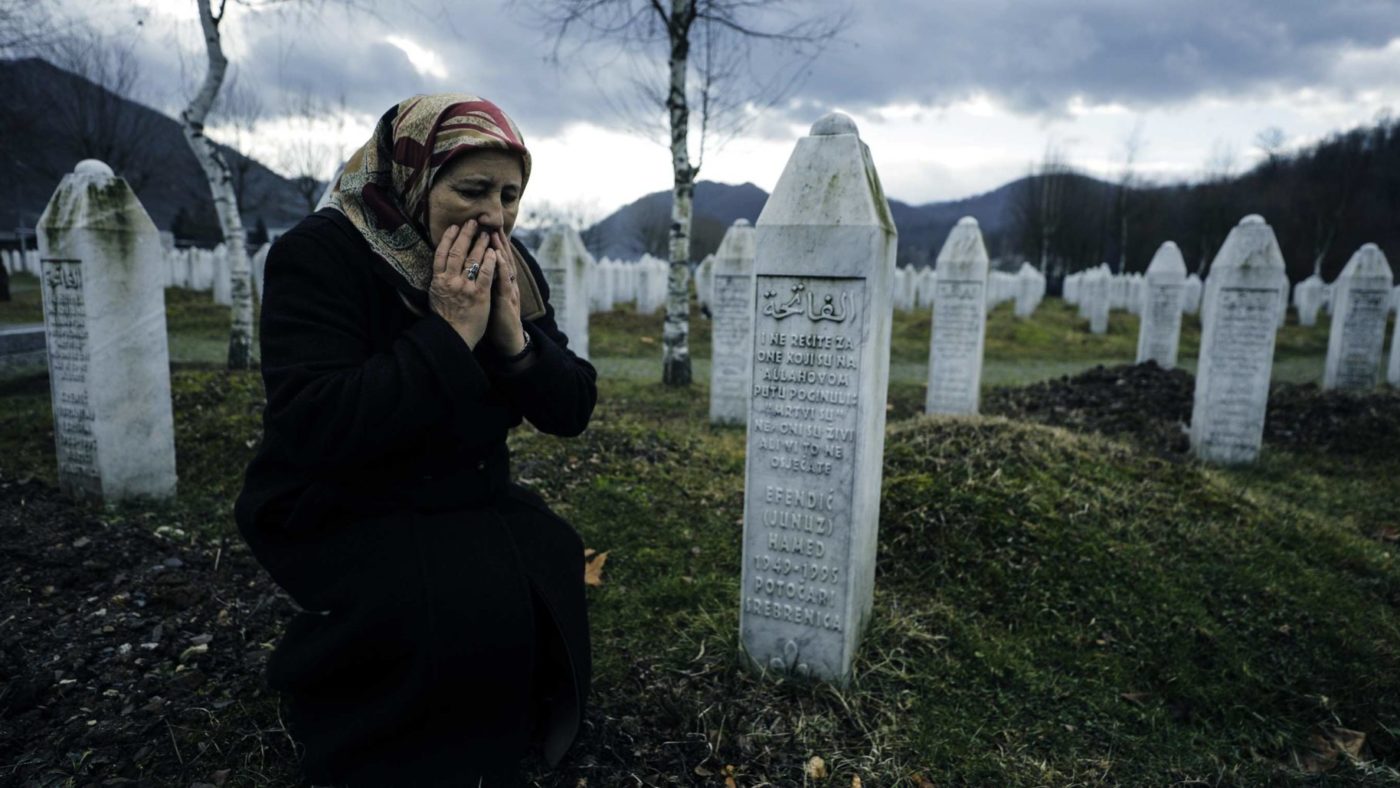Statues cause controversy. In Banja Luka, the second-largest city in Bosnia and Herzegovina, preparations are underway for creating and erecting one to Peter Handke, the 2019 Nobel laureate for literature. The motivation is not aesthetic but xenophobic. Banja Luka is the main city of the Republika Srpska, the Serb-majority political entity that has been carved out of Bosnia.
Handke was a vocal apologist for the Serb president Slobodan Milosevic throughout the Bosnian war of 1992-95. His literary output is shot through with the conspiracy theories that led him to this perverse activism. He denies that the massacre of 8,000 men and boys at Srebrenica in 1995 – which epitomised the brutality of the Serbs’ campaign of murder, rape and repression against Bosnian Muslims – was an act of genocide. The award was described by my newspaper, The Times, as a shameful decision that should forever haunt the Nobel committee.
This month marks the 25th anniversary of the Srebrenica genocide. Memorial events, organised by the educational charity Remembering Srebrenica, will be held throughout the UK, even with the lockdown. And it is almost beyond comprehension that there are not only fanatics on the political fringes who deny that Srebrenica happened, but that some of these people hold political office. Milorad Dodik, who serves as the Serb member of Bosnia’s tripartite state-level presidency, is among them. In 2018, Dodik unilaterally initiated an annulment of the Republika Srpska’s formal acknowledgment that Bosnian Serb forces had committed genocide. He is now proposing secession for the Republika Srpska.
Imagine a separatist movement in, say, the German federal state Saxony, protesting that Germany has been unreasonably laden with war guilt ever since the Nazi era. In the city of Chemnitz in 2018, riots fomented by the far right gained world headlines, and anti-immigrant protests there have never ceased. Well, that’s about where we are in Bosnia, where xenophobic lies have re-entered the political bloodstream through the Republika Srpska and its supporters.
The Western democracies failed Bosnia when it was under assault by Milosevic in a deranged campaign to create an ethnically pure Greater Serbia. The two other principal architects of this catastrophe, the Bosnian Serb leaders Radovan Karadzic and Ratko Mladic, are now serving life sentences for war crimes, genocide, and crimes against humanity. Milosevic avoided that fate by dying while he was on trial at The Hague. Naturally, his supporters in Serbia and the West have promoted a preposterous conspiracy theory that he was murdered by something called the New World Order to stymie the brilliance of his defence. (My uncle, Martin Bell, gave evidence for the prosecution at all three trials. He considered it his duty as journalist, having covered the war for the BBC, to tell the truth about what he’d seen.)
It’s comforting to think that, by putting in place the mechanisms of impartial justice (through the ad hoc International Criminal Tribunal for the Former Yugoslavia), some restitution has been served. That’s true only up to a point. On this quadranscentennial of the worst atrocity on European soil since 1945, I hope that some lessons will be instilled in our political culture.
First, genocide is everyone’s business. During the Bosnian war, especially in its early stages, the Western democracies did their utmost to avoid using the word “genocide” lest it legally compel them, under the terms of the 1948 UN Genocide Convention, to intervene. That was worse than a terrible misjudgment: it was a strategic error. A genocidal regime doesn’t have limited ambitions. It doesn’t stop. Milosevic went on to attempt genocide against the Muslim population of Kosovo, most of them ethnic Albanians, expelling 300,000 people from their homes in 1998-99 before a Nato bombing campaign thankfully stopped him. Non-intervention against aggression doesn’t mean that nothing happens; it means that aggression carries on unchecked.
Second, denialism of genocide and war crimes isn’t merely a curiosity of deluded cranks on the internet. It has real political repercussions. It needs to be fought and exposed. RT (formerly Russia Today), the state propaganda organ of the Putin regime, puts out this stuff reliably. On the 20th anniversary of Srebrenica, it published a piece by an obscure blogger (now a “senior writer at RT”) called Nabojsa Malic, who claimed: “Most propaganda about the Bosnian War relied on allegations of Serb aggression and genocide. All of them have, by now, been exposed as lies. Only Srebrenica remains, due to its elevation into a blanket excuse for Western ‘humanitarian’ warfare worldwide”. Lying about Srebrenica and traducing its victims is, for these people, an urgent cause. Avoiding these propaganda outlets, either as interviewee or employee, is a minimal requirement of decency and professionalism.
Third, diplomacy has a limit as well as a role. It’s commonly thought even now that the Serb campaign of aggression against the constitutional, multi-ethnic state of Bosnia came to an end with the Dayton Accords negotiated under the aegis of the US in 1995. That’s not correct. The agreement froze in place Milosevic’s territorial gains and secured international recognition for the Republika Srpska, even though its territory was not majority Serb before the war. We’re now facing predictable consequences of being too soft on Milosevic.
Finally, among the reasons for the West’s culpable inactivity during the Bosnian war, including an arms embargo that made it impossible for the Bosnian government to defend itself, was a widespread incomprehension of the notion of a thoroughly European Muslim population. These were not alien interlopers in our continent but an absolutely integral part of its history, against whom were ranged the very worst of forces. So that last lesson is also clear: the task of combating prejudice never ends.
Click here to subscribe to our daily briefing – the best pieces from CapX and across the web.
CapX depends on the generosity of its readers. If you value what we do, please consider making a donation.


